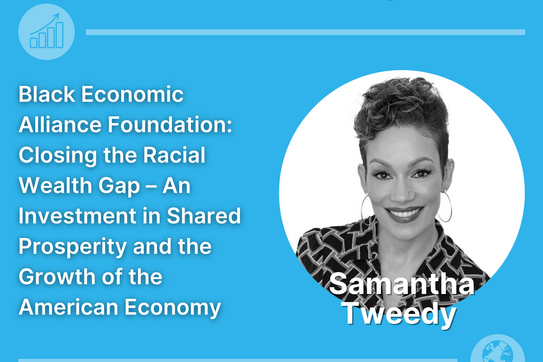In this episode of Capital for Good, we speak with Samantha Tweedy, the inaugural president of the Black Economic Alliance Foundation, the nation’s leading organization harnessing the collective expertise and influence of Black business leaders and allies to build generational wealth and economic prosperity for the Black community. Tweedy has spent her career building and leading transformative racial and economic justice initiatives at the intersection of the public, private, and philanthropic sectors, showing how equitable and inclusive growth creates a more prosperous country, and future, for all Americans.
In this conversation, Tweedy begins with personal history, explaining how her commitment to issues of equity and justice — for using the opportunities afforded her to create opportunities for others — comes via "osmosis," as she follows in the footsteps of grandparent trailblazers in the fight for civil rights and racial and economic justice. Tweedy describes how her early career in educational equity and access, as a litigator and school leader, gave her a deeper understanding of structural and multigenerational disparities. At the Robin Hood Foundation, she saw many uncomfortable but important truths in the data: the persistent black and white wealth gap in communities Robin Hood served and the fact that, despite increases in overall philanthropy, only 10 percent went to organizations led by people of color trying to solve problems of poverty racial and economic disparity in the first place. Accordingly, Tweedy launched Robin Hood’s nearly $20 million Power Fund to invest in and elevate nonprofit leaders of color focused on increasing mobility from poverty and addressing specifically, through the expertise and understanding of proximity and lived experience, the interplay of racial and economic injustice through their work. In many ways, this effort connects directly to the Foundation Tweedy is building and leading at the Black Economic Alliance — an organization committed to driving progress for the Black community, with a particular focus on improving economic outcomes in work, wages, and wealth. Only a few months into her new role, Tweedy is directing a range of policy, advocacy, and business and government engagement initiatives. She walks us through a few of these, including the new Center for Black Entrepreneurship, a partnership with Spelman and Morehouse Colleges, and the Black Economic Alliance Entrepreneurs Fund.
Mentioned in this episode:
- "Racial Equity and Philanthropy: Disparities in Funding for Leaders of Color Leave Impact on the Table," Cheryl Dorsey, Jeff Bradach, and Peter Kim (The Bridgespan Group and Echoing Green Report, 2020)
- The Power Fund
- Black Economic Alliance
- Black Economic Alliance Foundation
- Center for Black Entrepreneurship
- Black Economic Alliance Entrepreneurs Fund
